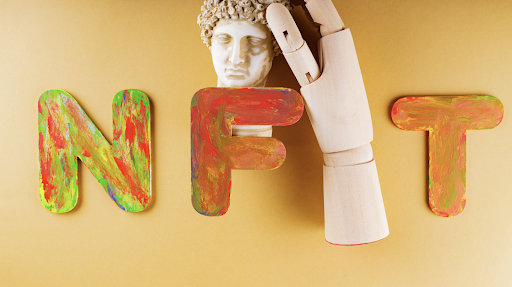Table of Contents
- Promising Alternative To Ethereum-Based NFT Marketplaces
- Improving the Value Proposition of NFTs By Adding More Utility
The craze for non-fungible tokens (NFTs) is spreading like wildfire. As more and more users, blockchain startups, and traditional businesses continue embracing the “phenomenon of the decade,” the demand for adding more utilities to these digital assets has also increased dramatically.
Although the NFT market capitalization has crossed well beyond the one billion mark, with total 2021 sales topping $20 billion, NFTs still have limited utility. NFT marketplace like OpenSea, Rarible, and others allow users to buy, sell, and trade NFTs, but there’s nothing much to do beyond those activities. For instance, if a user wants to use their NFT to earn an additional income, they won’t be able to because none of the existing platforms offer this functionality.
Most of the DeFi products and services don’t apply to NFTs. There aren’t many platforms that would offer loans against NFTs. Additionally, most NFTs just sit idly in users’ wallets given there are no available options to stake or lend them.
To fill this void and improve the value proposition for NFTs, Drops has developed a unique model designed to help users generate yields from otherwise unproductive tokens. This end-to-end platform for underwriting loans against NFT and DeFi assets opens the opportunity to access financing and generate yields from these valuable but utility-limited assets.
Promising Alternative To Ethereum-Based NFT Marketplaces
With Drops, anyone can experience the true potential of NFTs without any intermediaries or complications. The platform uses lending pools that enable any type of asset to be used as collateral – from NFT collectibles and metaverse items to financial NFTs and DeFi tokens.
Ethereum-based NFT marketplaces have already hit a brick wall in terms of costs. When it comes to gas fees, minting, buying, selling, even sending an NFT on any Ethereum-based platform is excessively expensive. In some cases, the gas fee exceeds the total value of the NFT itself. This has led to a severe drop in adoption, primarily because most NFT marketplaces are deployed atop Ethereum.
Using the layer-2 scaling solution Polygon, Drops obliterates Ethereum’s slow transaction speeds and high gas fees. At the same time, the platform uses Biconomy’s dApp technology, allowing it to subsidize all transaction costs while enabling users to interact with the platform as if they were using the Ethereum mainnet. In essence, Drops brings the best of Polygon’s scaling capabilities and low fees alongside the security and user-friendly features of Ethereum.
Improving the Value Proposition of NFTs By Adding More Utility
By providing multi-chain loans for NFT and DeFi assets, Drops adds more utility to NFTs and addresses the liquidity crisis in DeFi. The two core features of Drops that set it leagues apart from existing NFT platforms include: (i) converting NFTs into fungible ERC-20 tokens supported by permissionless liquidity pools, and (ii) borrowing liquidity provider (LP) tokens and staking them for additional tokens.
If you own DeFi tokens and NFTs sitting idle in your digital wallet, Drops helps you borrow against them. As long as you have NFT or DeFi tokens that can act as collateral, you will be eligible for a trustless loan instantly without having to speak to a lender or wait for approval.
Other than this, Drops have launched an improved liquidity platform called Drops DAO, built around the permissionless Drops Loans protocol. Moreover, with Drops, you can reap more rewards from your portfolio by supplying stable coins and governance tokens to the platform’s permissionless lending pools in exchange for attractive returns. Users who provide liquidity via supported tokens can generate variable returns and borrow from the pools.
With various partnerships and expansion, Drops continues to progress through the product roadmap. The platform has recently integrated Chainlink Price Feeds on their Ethereum mainnet for accurate, secure pricing of loans against various stablecoins and cryptocurrencies. Additionally, the company partnered with Enjin to enable staking and borrowing users' ERC-20 tokens against NFTs or in-game assets using Enjin's technology instead of traditional banks or lending products like credit cards. Other significant partnerships include Polygon, Oraichain, Parsiq, Solv Protocol, and Blockchain Gaming Alliance (BGA).
The platform supports a wide range of NFTs, including financial, gaming, and collectibles, among others. Drops is backed by prominent venture firms and investors like AU21 Capital, Axia8 Ventures, Bitscale Capital, Genblock Capital, x21, Quantstamp CEO Richard Ma, Sushi CTO Joseph Delong, Defiprime & DEXGuru CEO Nick Sawinyh, Cooper Turley from Audius, and Marc Weinstein from Mechanism Capital.
As the NFT ecosystem expands its still nascent footprint, the Drops platform is a beneficial addition. It adds more value to NFTs that would otherwise gather dust, helping it cement itself as the first NFT-focused project to bridge the NFT and DeFi ecosystems successfully. Owing to its permissionless lending and borrowing features, Drops harbors the potential to overpower existing peer-to-peer loan protocols such as NFTfi and Stater.
Disclaimer: This article is provided for informational purposes only. It is not offered or intended to be used as legal, tax, investment, financial, or other advice.














